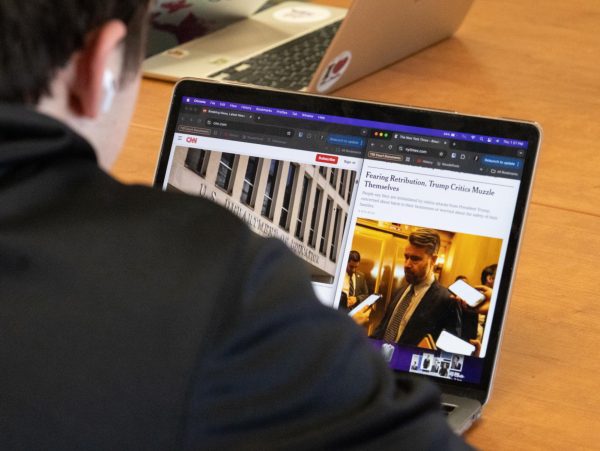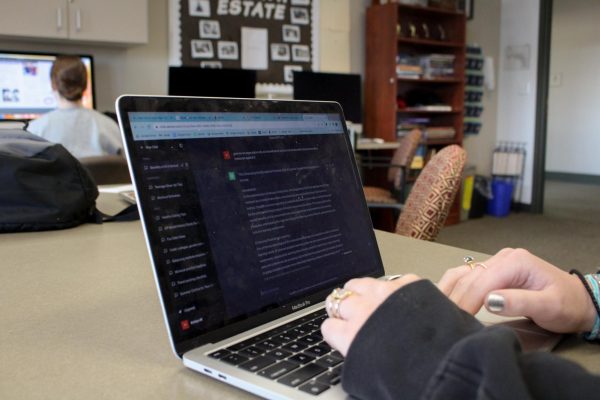SG responds to the Commercial Appeal
Photo: Elle Vaughn
The Commercial Appeal ran a story in May 2016 about St. George’s three-campus model and the first five graduates to begin their journey on the Memphis Campus, titled “Pioneering St. George’s Students Navigate Academic and Cultural Minefield.” The Gryphon Gazette reached out to a broad spectrum of people in the St. George’s community to ask if they would write a response to the Commercial Appeal article. These are the responses we received. We recognize that this may not represent every perspective in the school on this issue, so if you feel like your perspective was not represented here, we would love to hear from you. Responses that follow our guidelines will be published here or on our website.
Mr. Mac McCarroll, Parent
“I am proud of what St. George’s is trying to do, and I also appreciated the candor of all those quoted in the article. There will always be cultural differences between the races. That is a simple fact. But access to a St. George’s education, for those who qualify, tends to level the playing field of life regardless of culture. To try and paint this process as perfect is completely unrealistic, but accepting the imperfections, and trying to improve and move forward, is definitely the way to go. The races have to exist together, and the better we understand and appreciate our similarities and differences, the more groundwork there is to move forward.”
Mr. Jamie Roszel, Upper School English Teacher
“Ask my students how much I profess to care what others think and I hope the answer will be a unanimous, ‘I don’t.’ It is not that I don’t care about people, but rather the opposite. I love teaching because of the opportunity to connect with my students. Many other professions prevent these connections, but school environments encourage camaraderie and participation in a community. So, why don’t I care about opinions? Because everyone has one and we shouldn’t be able to hide behind them. Simply put, the phrases, ‘I think,’ ‘I feel,’ and ‘I believe’ just shouldn’t be enough to justify a person’s position on an issue.
When asked to respond to The Commercial Appeal’s profile on St. George’s, I thought carefully about my position before writing it down. Here is what I know to be true regarding the content of the article:
The St. George’s ‘experiment’ is well-intended and we are fighting the good fight. American schools are more segregated now than they were in the 1960’s. The odds that an African-American student attends an underperforming school are exponentially higher than the odds that a caucasian student will do so. The article highlighted challenges that our model encounters, but challenges are not a reason for not doing something. As a school, we have chosen to take on these challenges.
Diversity is better. Think it doesn’t matter whether you can get along with people who look different than you? According to Scientific American, ‘Citizens of other countries now receive more than half the Ph.D.s awarded by U.S. universities in engineering, computer science and physics, on top of earning one third of all college degrees in science and engineering.’ We are now a global society and what happens to some of us impacts all of us. We can’t have isolated pockets of people who only care about themselves.
Natural, ‘organic’ diversity just doesn’t seem to happen in the real world. The American Civil Rights movement was forced, as was women’s suffrage and same-sex civil unions. Gender equality and equal pay in the workforce needs to be addressed, and letting companies organically decide when to make it happen is turning a blind eye to the situation. As a school, we should confidently encourage integration: in the classroom, during social events, and on the athletic field. Double down on what works and refine it. Stop doing what doesn’t. Patting ourselves on the back for getting people in the same room isn’t enough. Studies have shown that unequal exposure to other races and members of other socioeconomic classes can often reinforce stereotypes; this means it isn’t enough to get people in the same room. We need to be united by what defines us, not divided by our zip codes or the stickers on our cars. Focusing on a deliberately chosen, common purpose will help to achieve that unity.
St. George’s is the only school in the Memphis area to which I applied to work; its mission is bold, especially in a city as divided as Memphis. However, our founding principles do not remove from our shoulders the responsibility to continue to provide a diverse, engaging environment for our students, faculty and families. Awareness does not equal action. I hope to see St. George’s build on its vision of a diverse student body and faculty that serves all families.”
Dr. Russ Wigginton, Former Board Member & parent
“Soon after joining the advisory committee I was asked to join the St. George’s Schools board as the middle and high school were founded. Early on in this role I was involved in countless strategic conversations with trustees, parents and citizens. Many of these conversations were intense and filled with questions about the unknown. Even today there are some who ask the same type questions: How will this work? Why would you engineer integration? What will be the school’s reputation? While I can appreciate the inferences behind these questions, my response has always been grounded in St. George’s having the foresight, courage and conviction to do what the school believes is the right thing to do. The school has never wavered from its decision. The school continues to grow and get better. While many other schools in the local area would never admit it, St. George’s has pushed them to re-examine themselves and their values. St. George’s has made them all better.
One of my most coveted recognitions was receiving the St. George’s Medal for Community Service. It matters to me because it comes from an institution that embodies so much of what I believe we’re all here for– -stand up and be counted as individuals and a community, be willing to take risks and be accountable for the consequences and be the change you want to see.
Time will tell the story of the St. George’s ‘experiment.’ I am convinced that fifty years from now people will applaud the good work of the St. George’s community.”
Senior Essence Davis
“In response to the ‘First Class: St. George’s Experiment’ Commercial Appeal article documented by Jane Roberts, which focuses on the recently graduated class of 2016, I think it is amazing to have the experiences of being a black student at St. George’s verbalized and recorded. It can be difficult to get others to understand your struggles, especially when they themselves may not face similar challenges, so I truly appreciate this platform, which allowed the commonly silenced perspectives a chance to speak. The controversy that this article has created, however, is no surprise to me. Whenever the uncomfortable topics come up, there will always be someone ready to sugarcoat the situation in the hopes of minimizing majority discomfort. ‘Damage control’ is not what situations like these need. What St. George’s as a community needs is empathy, empathy derived from the want to understand instead of pre-
judge, a want to diversify instead of divide. Moreover, in response to those who said, ‘He [Will Courtney ‘16] could have said that better’ or ‘I agree, but the way he presented it would have come across better if he (insert new behavior here),’ it seems as though their (Will Courtney’s, Zearius Jenkins’, Erica Stevenson’s, Autumn Jones’, Paige Madison’s, Donovan Borum’s) points were overlooked, minimized and replaced with people’s needs to grammatically correct and eloquently restate their reality. It is important to remember that sometimes, it’s more important that you say something, anything, rather than sit back and watch injustices take place. As Zora Neale Hurston once said, ‘If you are silent about your pain, they’ll kill you and say you enjoyed it.’ So let us speak!”












